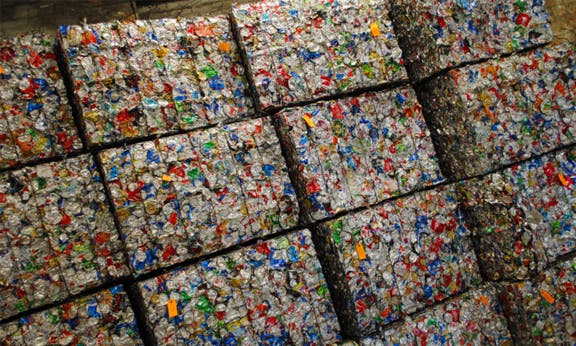Australia’s recycling crisis bites, but there’s an easy fix

Australia’s recycling system is on the brink of collapse. Around the country, recyclers are holding giant stockpiles of paper, cardboard and plastic collected from kerbsides. Much of this is destined for landfill.
The immediate cause of the crisis was China’s decision to ban imports of 24 categories of solid waste and focus on improving its own recycling systems.
Australian recyclers have baulked at increasing their own capacity. Instead of investing in the infrastructure and jobs required to process and recycle material domestically, they’ve been happy to book the short term profits from packaging the stuff and shipping it overseas.
China’s import ban has spoilt the party. With the world’s biggest buyer dropping out of the market, the price of recyclable waste has plummeted. The average price of mixed paper scrap has fallen from around $124 a tonne to zero. Mixed plastics have dropped from $325 a tonne to $75 a tonne.
There’s no longer a functioning market for recyclable material in Australia. Under the conditions created by China’s ban, it costs more for recyclers to process and recycle material than they can gain from selling the final product.
In the short term, this means that recyclers are sitting on increasingly gigantic piles of waste, hoping that prices will recover. Inspections carried out by the Victorian Environmental Protection Authority since October have identified more than 200 “high-risk” recycling stockpiles across the state.
The inspections were undertaken in response to a fire at the SKM recycling plant in Coolaroo last year. The fire lasted for 11 days, shrouding surrounding suburbs in toxic smoke. The longer the crisis goes on, the more likely it is that another fire breaks out.
Where recycling can’t be stockpiled, it’s being dumped in landfill. Charges associated with this are being passed from the recyclers to local councils, many of which have flagged significant rate rises to cover the cost.
You heard that right. Increasing quantities of the recyclable material we diligently separate from our other rubbish and put out for collection each week are being dumped back into landfill. And we will be forced to pay more for the privilege.
The question is, how could something so seemingly straightforward have been messed up so spectacularly? How is it that decades of inculcating a culture of household recycling could be pissed up against the wall, with the recycling industry and governments left scratching their heads?
The biggest take-home lesson of the crisis is also the least likely to be heeded: that when it comes to environmental sustainability and other basic, public goods, the “free market” invariably fails.
If, instead of Australia’s recycling system comprising a mess of private companies each competing for its slice of the pie, the whole thing was owned and run by the state, there would be no crisis. Over the decades since kerbside recycling programs were first introduced, we could have built up a more than adequate capacity to process and recycle our waste domestically.
This would be a classic win-win: good for the environment and good for jobs.
Yet politicians of all stripes are blinkered by their commitment to finding a market solution to the crisis. Victorian environment minister Lily D’Ambrosio said it most clearly. Rightly criticising the federal government for its inaction, she said, “They need to articulate what they can do as a government, as a procurer of products and as an investor in major projects … to help to drive new markets and grow existing markets for the use of recycled products”.
This is straight-out corporate welfare – a proposal to “fix” the crisis by spending millions to prop up the profits of recycling companies.
The Greens have released a more substantial plan. This involves a range of initiatives designed both to reduce waste being produced and to enhance domestic processing capacity. But, like Labor, their unwillingness to break with the sacrosanct “logic of the market” leads them down the path of “incentivising” recycling companies to lift their game.
This all amounts to fiddling while Rome burns. All it would take is political will, and the whole thing could be fixed in a matter of months.
Take the recycling system back into state hands, and invest in the sorting and processing capacity required to deal with all our waste domestically. This would involve a significant outlay of public funds. But it’s not like there’s a shortage on that front.
In Victoria, for example, the government collects around $200 million every year in landfill charges. This money has been pooled into a “Sustainability Fund” that is estimated to contain at least $500 million. Over the past decade, both Liberal and Labor governments have sat on this money to bolster the state’s credit rating.
Perhaps we could also dip into the $3.8 billion the federal government has put aside as a slush fund for Australia’s arms exporters. Or maybe (heaven forbid!) think of the contribution that could be made by the 732 companies that, according to the Tax Office, paid no tax in Australia in the 2015-16 financial year, despite reporting a collective income of more than $500 billion.
All this would just be the start. The world’s waste crisis goes well beyond just the breakdown of our recycling systems. The volume of waste being produced is increasing exponentially, with devastating consequences for the environment. Our ability to recycle a portion of that waste is important, but it’s far from a long term solution.
To build a genuinely sustainable world economy we need to break with the logic of capitalism, which values short term profits above the needs of the rest of us.